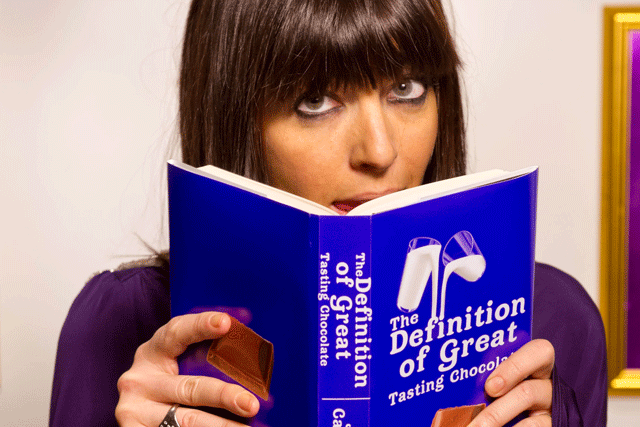
There are myriad examples of brands picking celebrity tie-ups for ad campaigns, from Usain Bolt's amplification of Virgin Media's "Superfast" broadband, to EE’s dramatisation of the "Six degrees of Kevin Bacon" parlour game to demonstrate the connectivity of its 4G network.
However, three celebrity tie ups in the past month deserve a little more scrutiny. Procter & Gamble (P&G) recently revealed Colombian pop star Shakira as the global ambassador to toothpaste brands Crest and Oral B, citing the "brilliance of her smile".
What we had to ask ourselves was, 'Do we think that consumers in the real world would believe Claudia Winkleman is a chocolate loving chatterbox?' - she's an energetic and bubbly woman so it's not that hard a stretch
"Measuring credibility is subjective," admits Rick Lawrence, marketing manager for Cadbury Dairy Milk at Mondelez, but it remains at the crux of choosing a celebrity spokesperson. In February, Lawrence signed TV presenter Claudia Winkleman up as a "chocolate loving chatterbox" to drum up awareness around the brand's search for an "Honorary Cadbury Taster" who could come up with a new word to describe the taste of Cadbury's chocolate.
"What we had to ask ourselves was, 'Do we think that consumers in the real world would believe Claudia Winkleman is a chocolate loving chatterbox?'," he explains, adding: "She is an energetic and bubbly woman in everything that she does and most people are chocolate-likers, so believing that Claudia loves chocolate is not that hard a stretch."
Stretch too far
Bruce Lee's resurrection through the use of CGI animation, 40 years after his death, and undertaken so that he could appear in an ad for a premium whisky brand, has proven a stretch too far for many consumers.
The South China Morning Post reported that when the ad launched alongside commemorative activity to mark the milestone, fans and Chinese film makers branded the ad a "disgrace". Diageo defended itself by claiming it was looking for a "game changer" for the new Blue Label brand extension that mixes together both old and new whiskey.
Lee’s daughter Shannon was involved in the making of the ad and has urged fans to see the creative "like Johnnie Walker sponsoring a mini film about Bruce Lee," celebrating his life and philosophies, instead of being a slight on his character. However, she admitted her father did not drink and that the

How then, can brands avoid making a bad call when selecting a celebrity? Sports marketing research company Repucom and agency The Marketing Arm believe they have found the answer with an index which measures and compares the impact of more than 5,000 celebrities across 13 markets.
The Celebrity Davie-Brown Index (Celebrity DBI) measures across eight metrics: appeal, aspiration, awareness, breakthrough, endorsement, influence, trendsetter and trust. According to the tool, Bruce Lee ranks as number 18 out of 325 celebrities in
Interestingly, in the
Clear machinations
Despite P&G’s Stephen Squire, global marketing director for the oral care category, claiming he is "thrilled to have a beautiful, strong woman of Shakira’s calibre to represent the brand," Cadbury’s Lawrence is mindful that there will be clear machinations behind the singer’s appointment, even if it is difficult to see from the outside.
Danny Spronz, founder of marketing agency dot.Talent, which helps to match brands with the right celebrity ambassadors, says that celebrities’ reach in the digital space allows them to have daily interactions with their fans. Despite some brands like Burberry reaching more than 10m likes, their numbers are "dwarfed" by big celebrities on Facebook, giving the people like Beyoncé or David Beckham "a huge amount of influential power".

"Shakira has 63m Facebook fans, Crest has far fewer. It’s therefore understandable that global brand powerhouses such as P&G should want to engage in a new way with celebrities," he adds.
Not that P&G’s teaming up with celebs is anything new; its 2012 Olympic strategy of sponsoring athletes and pairing them with its brands proved effective. The new partnership with Shakira will see her appear in Crest and Oral B ads, while P&G will support the singer’s charity, the Barefoot Foundation.
Jamie Wynne-Morgan, managing director at M&C Saatchi Sport & Entertainment agrees that celebrity partnerships can be extremely successful for brands – as long as they are the "right fit".
Another way of looking at the Shakira deal is that if 90% of her 63m Facebook fans were not to agree with the partnership and not to see it as credible then it’s a completely negative outcome
There is a gap in the market, he says, to treat individuals the same as commercial brands, rigorously analysing them with hard research, which is why M&C Saatchi Group acquired talent management agency Merlin. The agency, known as M&C Saatchi Merlin, is determined not to simply sell a celebrity on its books to a company’s marketer just for the money.
"Another way of looking at the Shakira deal is that if 90% of her 63m Facebook fans were not to agree with the partnership and not to see it as credible then it’s a completely negative outcome," Wynne-Morgan says.
He argues brands have a responsibility to treat celebrities themselves as brands, measuring their profile and the demographic of their audience to make sure the partnership will be mutually beneficial. "Consumers are interested in celebrities and that drives conversations," he says, and if a partnership is interesting or controversial then it will get discussed all over the world.
It’s clear that brands have the power to tie up with whichever celebrity they please, but if consumers can’t logically match Bruce Lee with a whiskey brand; understand why Jay Z would sell his download rights to a tech brand; or understand why Shakira is synonymous with toothpaste, then the partnerships will have been made in vain.


.jpg)


.jpg)